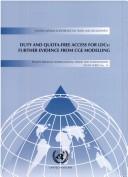| Listing 1 - 2 of 2 |
Sort by
|
Book
ISBN: 1451862709 1462368999 1451908067 9786613823649 1452750157 128344979X Year: 2006 Publisher: Washington, D.C. : International Monetary Fund,
Abstract | Keywords | Export | Availability | Bookmark
 Loading...
Loading...Choose an application
- Reference Manager
- EndNote
- RefWorks (Direct export to RefWorks)
This paper assesses the effects of reducing tariffs under the Doha Round on market access for developing countries. It shows that for many developing countries, actual preferential access is less generous than it appears because of low product coverage or complex rules of origin. Thus lowering tariffs under the multilateral system is likely to lead to a net increase in market access for many developing countries, with gains in market access offsetting losses from preference erosion. Furthermore, comparing various tariff-cutting proposals, the research shows that the largest gains in market access are generated by higher tariff cuts in agriculture.
Electronic books. -- local. --- Exports -- Developing countries -- Econometric models. --- Tariff preferences -- Developing countries -- Econometric models. --- Tariff preferences --- Exports --- Econometric models. --- Differential duty --- Discriminating duty --- Generalized system of preferences (Tariff) --- GSP (Tariff) --- Preferences, Tariff --- Preferential duty --- Preferential tariff --- Trade preferences --- International trade --- Tariff --- Exports and Imports --- Taxation --- Economic Theory --- Trade Policy --- International Trade Organizations --- Empirical Studies of Trade --- Economic Integration --- Trade: General --- Neoclassical Models of Trade --- Agriculture: Aggregate Supply and Demand Analysis --- Prices --- Public finance & taxation --- International economics --- Economic theory & philosophy --- Tariffs --- Comparative advantage --- Demand elasticity --- Imports --- Taxes --- Economic theory --- Elasticity --- Economics --- United States

ISBN: 9211125332 9789211125337 Year: 2002 Volume: 14 Publisher: New York United Nations
Abstract | Keywords | Export | Availability | Bookmark
 Loading...
Loading...Choose an application
- Reference Manager
- EndNote
- RefWorks (Direct export to RefWorks)
Tariff --- Tariff preferences --- Non-tariff trade barriers --- Duty-free importation --- Econometric models --- Developing countries --- Commercial policy --- Foreign economic relations --- 339 --- -Non-tariff trade barriers --- -Tariff --- -Tariff preferences --- -Developing Countries --- Developing Countries --- Differential duty --- Discriminating duty --- Generalized system of preferences (Tariff) --- GSP (Tariff) --- Preferences, Tariff --- Preferential duty --- Preferential tariff --- Trade preferences --- Ad valorem tariff --- Border taxes --- Customs (Tariff) --- Customs duties --- Duties --- Fees, Import --- Import controls --- Import fees --- Tariff on raw materials --- Indirect taxation --- Revenue --- Customs administration --- Favored nation clause --- Reciprocity (Commerce) --- Non-tariff distortions of trade --- Nontariff trade barriers --- Protectionism --- Customs exemptions --- Duty-free entry --- Tariff, Exemption from --- Tariff exemptions --- Cross-border shopping --- Handel. Internationale economische betrekkingen. Wereldeconomie --binnenlandse als buitenlandse handel; zie ook {339.3} en {339.5} --- -Econometric models. --- Foreign economic relations. --- Econometric models. --- 339 Handel. Internationale economische betrekkingen. Wereldeconomie --binnenlandse als buitenlandse handel; zie ook {339.3} en {339.5} --- Emerging nations --- Fourth World --- Global South --- LDC's --- Least developed countries --- Less developed countries --- Newly industrialized countries --- Newly industrializing countries --- NICs (Newly industrialized countries) --- Third World --- Underdeveloped areas --- Underdeveloped countries --- Tariff - Developing countries - Econometric models --- Tariff preferences - Developing countries - Econometric models --- Non-tariff trade barriers - Developing countries - Econometric models --- Duty-free importation - Developing countries - Econometric models --- Developing countries - Commercial policy - Econometric models --- Developing countries - Foreign economic relations
| Listing 1 - 2 of 2 |
Sort by
|

 Search
Search Feedback
Feedback About UniCat
About UniCat  Help
Help News
News